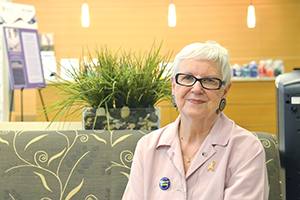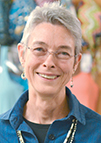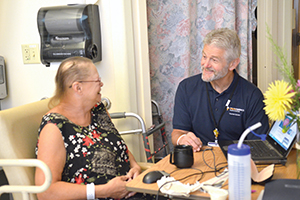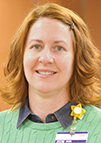By MARGARET GILLERMAN
"I thought it was the end of my world, my darkest day, and I picked up the phone," Carol Couch says, recalling the time she called the Providence Portland Medical Center's peer cancer support program.
The Portland, Ore., grandmother says chemotherapy for breast cancer had left her feeling drained, confined and isolated. "I couldn't load my family with any more worries," she says.
"I was sick, I didn't want to leave my apartment, I couldn't drive. I ran my fingers through the entire Providence directory and sure enough there was the breast cancer number. I called and a person answered at the breast cancer outreach program. By the time I got through talking to her — we chatted 10 minutes — I was totally out of my funk."

After her recovery, Couch says she felt grateful for the support she had received. And so, beginning in 2009, a year after she finished therapy she enlisted as a peer volunteer. Couch turned 80 in January.
Breast cancer survivors like Couch have been supporting their peers undergoing treatment through programs provided by Providence Health & Services since 1988. Today the main services are through the Breast Cancer Peer Support Program at Providence's two Portland hospitals, Providence St. Vincent Medical Center and Providence Portland Medical Center. Providence is now expanding peer support to patients with other cancer diagnoses as survivors express an interest in helping others with similar diagnoses. Peer support is also available for patients undergoing inpatient rehabilitation at the Providence Acute Rehabilitation Center following traumatic injury or illness, such as stroke. (See sidebar.)
Voice of experience
Beth Ruml, a nurse and licensed clinical social worker in oncology at Providence St. Vincent Medical Center, has worked with the Breast Cancer Peer Support Program on and off as it has grown.
"There's no more effective healer than a wounded healer, someone who has walked the walk," Ruml says. "People want to talk to each other. They want to know, 'How did this feel? How can I cope with this? How did you communicate about this with your family? How do you deal with a husband who doesn't want to touch you?' All these are questions only someone who has been there really understands deeply."
The peer program got its start because a breast cancer survivor, Chris Mulder, told her oncologist she had not felt emotionally supported during her treatment; she wanted to make sure other patients never felt that bereft. "It planted the seed and it grew," Ruml says. The precursor of the Providence peer support program started in that oncologist's office and Ruml facilitated those early support groups.
"I'd come in after a long work day, exhausted, not sure how I'd get through the group session. But I always left totally invigorated, inspired and charged, because that's the energy of a group of women helping women. I was inspired after each meeting, experiencing the strength of these women and their compassion for each other."

Vulnerability and boundaries
Today Ruml helps teach in the orientation program for peer counselors in the breast cancer program. Volunteer counselors need to be one year posttreatment and be recommended by an oncologist based on their coping skills and personality fit for the role. The precautions are needed because peer volunteering may be emotionally difficult for some cancer survivors. Ruml says preferred traits for peer counselors include emotional intelligence and good mental health.
In orientation, "we spend time talking about communication skills and boundaries, which can be tricky for the new support people," Ruml says. "Peer volunteers are vulnerable. We want them to share, but it's easy for them to get overly invested in the newly diagnosed person's journey, especially if there are a lot of similarities to their own.
"Their story is their gift, and it's also their vulnerability," Ruml says. "Women may have questions regarding options for surgery, lumpectomy or mastectomy; options for reconstruction (or not); talking to and caring for young children; dating and sexuality after breast cancer; and working through treatment," Ruml says. "These are very common situations that women care about."
Couch, the peer support volunteer, says, "People just want to share what they're concerned about to somebody who gets it." In addition to connecting with patients through referrals from the programs, Couch says she also meets patients through her volunteer work at the Jill Lematta Learning Center, a lending library in Providence Portland Medical Center's cancer center.
Typically, patients will indicate to their clinicians that they want to speak to somebody who's experienced cancer treatment, and peer mentors are paired with those patients. The meetings may be in person or by phone.
Couch says that once she contacted a woman who had been recently diagnosed, and the woman was so upset they agreed it would be best to meet for a face-to-face conversation.
"The diagnosis to her meant what it means to many when we hear it — we think death — especially older people. That's what we grew up with." The woman said she didn't know how to tell her son about the diagnosis.
Couch told her how she explained to her family about her diagnosis.
The woman asked her, "'What's ahead? How terrible is it? What's chemo going to be like?'" Couch says, "I could share the good and bad of chemo and what doctors can do for the nausea." The woman wanted to know, "'Does radiation burn?' I could share what I experienced, so she wasn't so panicky."
By the end of their conversation, the woman was calmer and less afraid, Couch recalls, and that left Couch feeling satisfied. "I feel like I was saved on my dark day, and my goal is to be open and pay it forward," she says.


